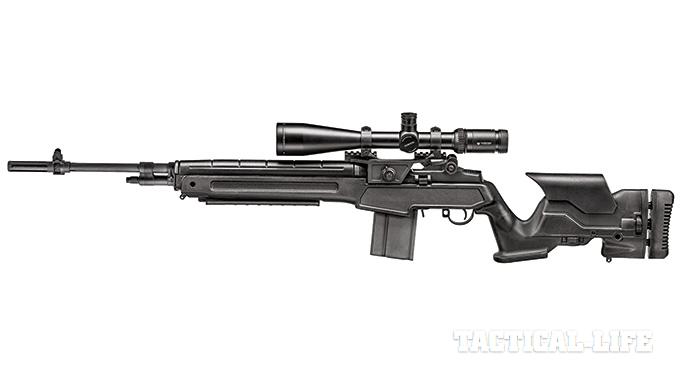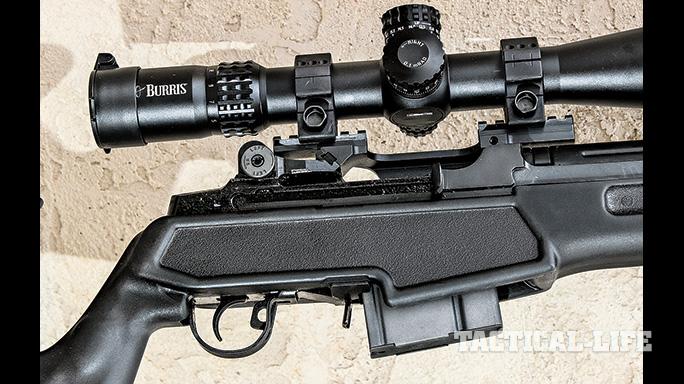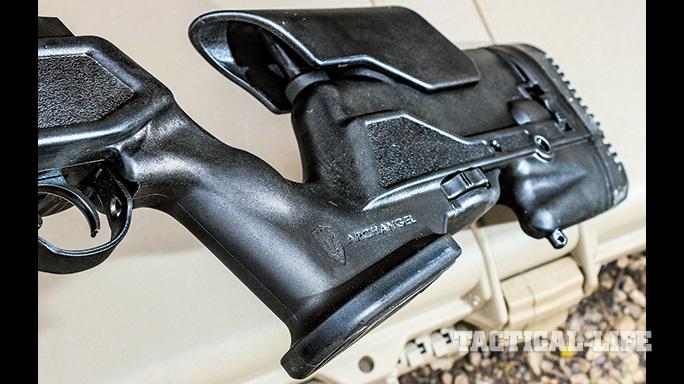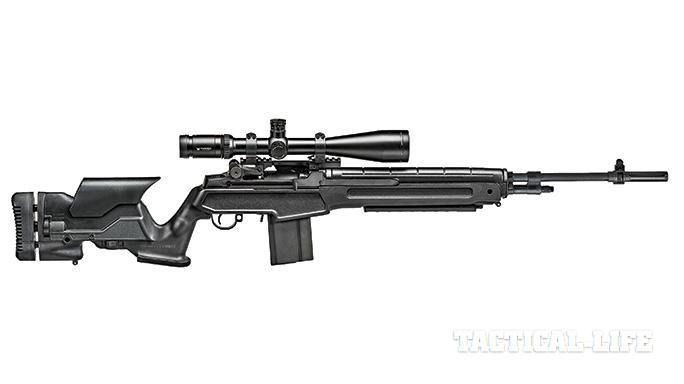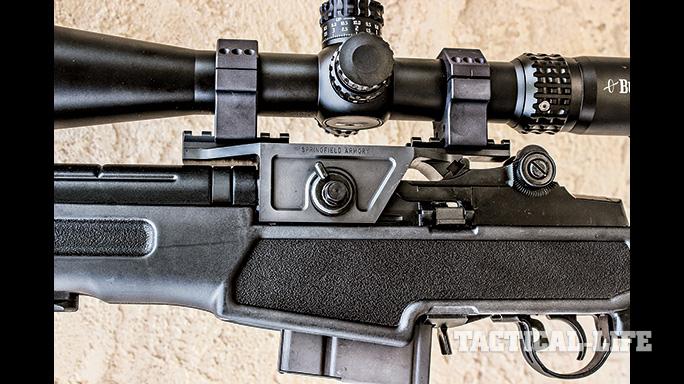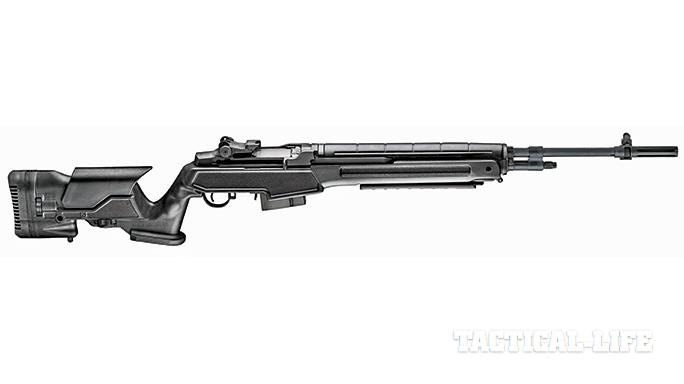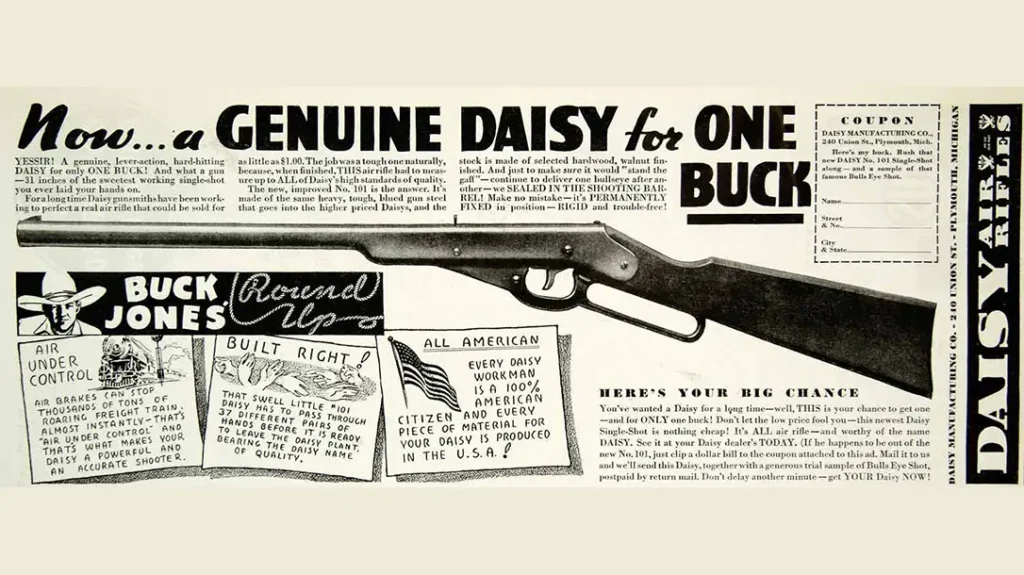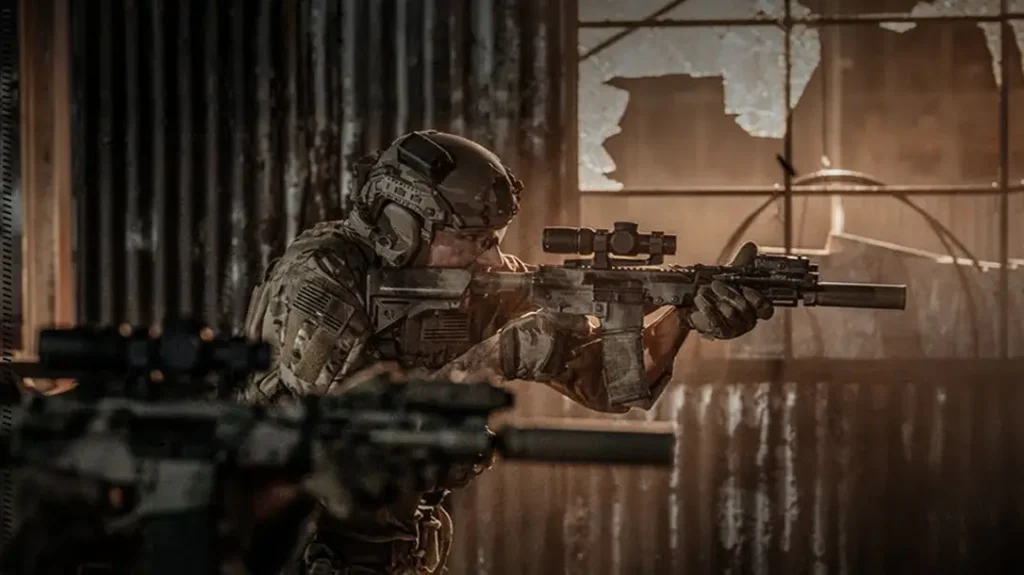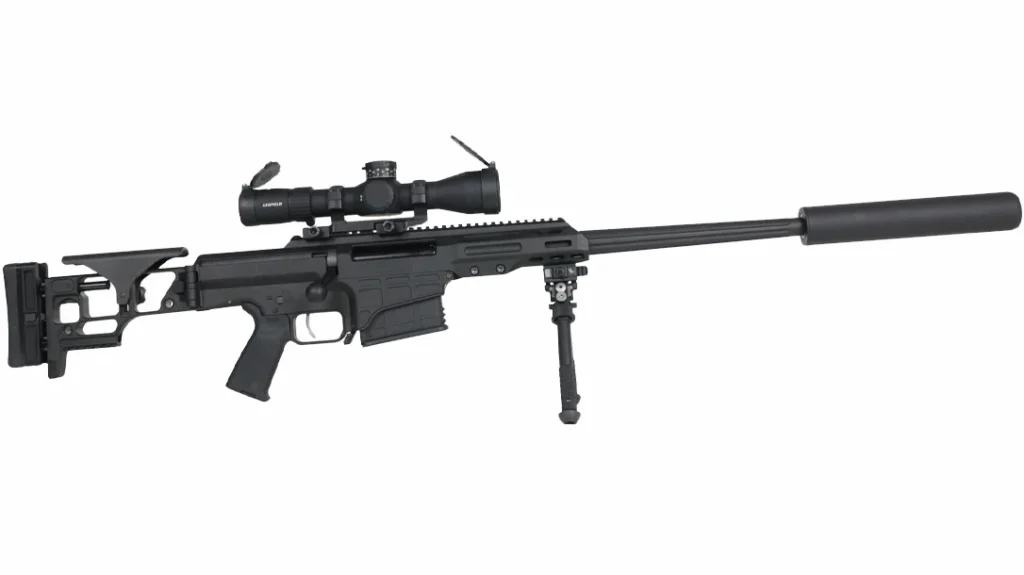One of the most iconic rifles to grace American ranges is the Springfield M1A. The M1A is the semi-auto version of the classic M14. To better understand the love affair with this gun, we need to look at its history.
In 1957, the M14 replaced the M1 Garand after extensive competition during previous years. The U.S. military was looking for an improvement on the Garand that included a detachable magazine and full-auto capability. The accuracy and reliability of the rifle soon found it being modified for specialized work.
- RELATED STORY: Top 10 Features of the Springfield Armory Loaded M1A
In 1969, Rock Island Arsenal converted over 1,400 National Match M14s to be used as sniper rifles during the Vietnam War. The modifications included the addition of a Leatherwood 3-9x scope and providing match-grade ammunition to the shooters. This version was designated the M21, and it remained the U.S. Army’s primary sniper rifle until 1988.
Advertisement — Continue Reading Below
Even after its retirement, the M21 kept finding its way back into war. During the Gulf War, it was seen being carried by several elite units throughout the military.
Fast-forward to today and we find the M1A still a popular rifle in the shooting industry. Like many of its World War II cousins, it has seen its share of small improvements based on evolutions in manufacturing processes. Competitions around the country see enthusiastic shooters unpack their M1As for precision matches.
Springfield has the distinction of allowing civilian shooters an opportunity to own their very own semi-auto version of the M14. In 1974, the company began manufacturing what would be labeled the “M1A.” This civilian M1A was so close to the M14 that Springfield initially used surplus GI parts to build its guns. Eventually, the company began to make all of the parts in-house, and was able to improve the platform’s accuracy in the process. In fact, until the very late 1990s, the rifle still had the cutout in the right rear of the stock for the full-auto selector.
Advertisement — Continue Reading Below
Over the years, Springfield has revisited the M1A many times with success. The masterminds at Springfield have once again turned to the M1A to improve an already exceptional gun. The company’s latest offering is the Springfield Loaded M1A with a Precision Adjustable stock. It is a mix of classic old with modern, game-changing improvements.
Gun Details
The nature of the original M1A made scoped shooting a challenge without some (usually homemade) stock modifications, such as cheek risers. The Precision Adjustable stock solves this and brings more to the table. It is adjustable not only for cheek height, but also length of pull. All adjustments can be done without the use of tools and are small enough for shooters to find the perfect fit behind the gun. Another improvement in the stock is the inclusion of a Picatinny rail on the bottom of the forend. This makes mounting a bipod or other kit a breeze. At the rear of the stock is a specially cut notch that allows shooters to brace the rifle against their shoulder with their support hand for stability.
Advertisement — Continue Reading Below
The 22-inch, air-gauged, National Match, medium-contour, Parkerized, chrome-moly barrel has a 1-in-11-inch twist rate and comes capped with a National Match flash suppressor. The Loaded M1A also has a National Match trigger group with a smooth, crisp break.
The Loaded M1A comes with match-grade sights, including a National Match front blade sight that is 0.62 inches tall. The receiver sports a match-grade, non-hooded rear sight offering 0.5-MOA windage and 1-MOA elevation adjustments.
The original M14 was not designed with optics in mind. The accuracy of the rifle, however, soon began to call for the inclusion of glass and attempts at mounts were made. Springfield’s modern answer is the 4th Generation Steel Scope Mount. This optional mount is not only rock solid, but installing it on the rifle is also a breeze.
Advertisement — Continue Reading Below
Shooting Impressions
The range test of the Springfield Loaded M1A would consist of two parts. First would be a bench test for accuracy. This would be followed by off-hand shooting to evaluate the rifle in a more dynamic setting. On the bench, I stabilized the rifle with an Atlas bipod and a rear sand sock. To wring out the rifle’s accuracy, I mounted an excellent Burris 5-25x50mm XTR II scope with an illuminated G2B mil-dot reticle. I fired five-round groups at 100 yards with Federal’s 168-grain Gold Medal Match ammo, Black Hills’ 168-grain Match HPBTs and Patriot Munitions’ 168-grain AccuFlight rounds.
The trigger press on the Loaded M1A was consistent and clean with a break at round 4.5 pounds. Recoil was minimal simply because the M1A is, for lack of a better term, a big gun. Weighing in at over 12 pounds dressed out, it is capable of soaking up some recoil. After zeroing and adjustments, the serious business of seeing what kind of accuracy the rifle could deliver began. With a zero value wind of less than 2 miles per hour at my back, I shot strings of five rounds with each flavor of ammunition. The results were very pleasing. With the acknowledgement that this was initially deigned as a battle rifle, my expectations for super accuracy were low. I was pleasantly surprised when I was able to pull off sub-MOA groups with all three of the loads I tested.
Advertisement — Continue Reading Below
Next up was a more dynamic and perhaps less scientific test of the gun. After hearing my father talk about the M14 he carried in dangerous places, I wanted to see what it was like to move and shoot with its semi-auto brother. I have always respected the men who carried old school “log and iron” rifles, but it was enlightening to run modern drills with this gun. Ignoring the weight and length of the rifle, it performed extremely well. From barricade drills to urban prone, the loaded M1A stayed with me every step of the way. It is easy to see why the M14 was admired by so many of the people who carried it.
Final Notes
The new Loaded M1A from Springfield Armory, with its Precision Adjustable stock, has caught the eye of law enforcement as a countersniper platform. As agencies cover large events across the country, they are always on the lookout for dangers posed by gunmen. The Loaded M1A’s accuracy, combined with its semi-auto capability and detachable box magazine feeding, allows it to fit this niche quite well. The additional fact that the M1A pushes out a 7.62mm NATO round makes it a valuable tool for defeating barricades and other factors that may stop the popular 5.56mm NATO round. The final piece of this puzzle is that an agency can get into a Loaded M1A for significantly less than most other precision rifles. While some would argue that price should not be a factor, the brutal reality is that it does.
Advertisement — Continue Reading Below
The Loaded M1A combines the old with the new in a seamless fashion. Springfield has put together a rifle that has exceptional features without the custom shop price tag. It is an accurate and reliable rifle that will serve any shooter for years to come. From recreational shooting to competition, the Loaded M1A is a solid addition to the Springfield line.
For more information on the Loaded M1A, call 800-680-6866 or visit springfield-armory.com.
- RELATED STORY: New For 2015: Springfield’s Combat-Ready 1911 MC Operator
